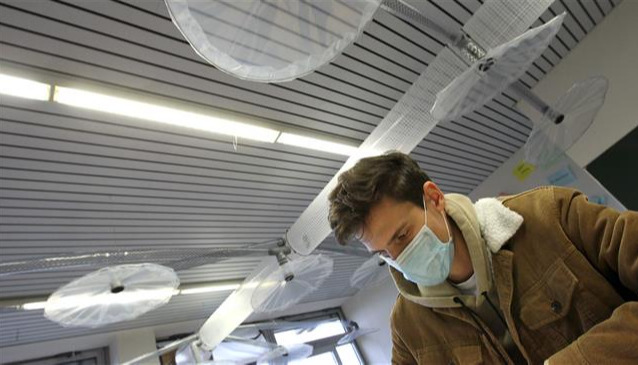
A ventilation system installed in a classroom is pictured at the IGS school in Mainz, western Germany. (Photo: AFP)
Berlin, November 13 (RHC)-- Germany's health minister said on Thursday he expects restrictions imposed to curb the coronavirus pandemic will continue through winter, with life unlikely to get back to normal in December or January even if infections fall.
"I don't see events with more than 10 or 15 people happening this winter," Jens Spahn told RBB broadcaster.
Germany reported 21,866 new coronavirus cases on Thursday, bringing the total to 727,553 and jumping back above 20,000 after four days below that figure, while the death toll rose by 215 to 11,982, according to the Robert Koch Institute (RKI) for infectious diseases.
Chancellor Angela Merkel and the leaders of Germany's states are due to meet on Monday to review whether partial lockdown measures imposed on November 2nd have been enough to slow a steep rise in new infections that risks overwhelming hospitals.
Merkel said on Thursday there were hopeful signals that a coronavirus vaccine could be on the horizon, but warned it would take time. She declined to say whether Germany might allow bars and restaurants to open again in December.
"We all have to be sensible, we have to get down to 50 cases per 100,000 people over 7 days," she said in response to a question on whether the lockdown would end this month. The figure is currently 139 per 100,000.
Unlike its first lockdown earlier this year, Germany is keeping its schools and daycare centers open so that parents can go to work, limiting damage to the economy, although at least 300,000 pupils and 40,000 teachers are currently in quarantine.
A survey for broadcaster ARD showed 54% of 1,004 Germans polled believed the partial lockdown measures were appropriate. Separately, the Constitutional Court rejected an appeal to overturn the closure of restaurants, in force this month.
As the number of cases rises, the source of infection is unknown in most instances, the court reasoned. "This means that it cannot be ruled out that restaurants also contribute to the occurrence of infection," it said in its ruling on Thursday.
RKI head Lothar Wieler said on Thursday that he expected rules to slow the spread of the pandemic in Germany to remain in place for a long while as a vaccination would take time and there was likely to be an uncontrolled spread of COVID-19 in some parts of the country.
The slowing dynamic of infections gives ground for cautious optimism, but it is not yet clear whether this is a stable development, and hospitals are still expected to reach capacity, Wieler added.
Ute Rexroth, the head of RKI's surveillance unit, said the pandemic would have a reproduction rate, or "R," of 3 to 4 without current measures on limiting social contact while the factor currently stands at around 1 in Germany.
She said case numbers might not be rising as steeply as in October because of the new lockdown measures, but it might also be due to testing labs reaching capacity. Wieler noted that there was currently a high incidence of COVID-19 in those aged 10 to 19.

